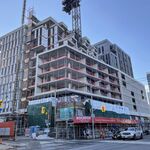andrewpmk
Senior Member
I figure without an HST increase, we will be getting 1 billion a year instead of 2 billion. Plus we have the political problem that we can't spend a disproportionate amount of the money in Toronto proper, which only has about 40% of the population, so suppose Toronto proper gets 400 million per year. The DRL will suck up a huge amount of money leaving no money for anything else. Hence, with a smaller tax increase, the only way to get enough money to build the DRL is to kill other projects. With a larger tax increase we would have money to build several subway lines and GO expansion, with a small tax increase we are limited.




